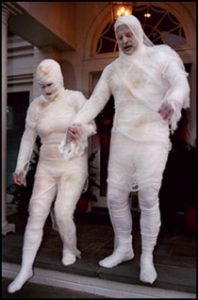 Medicaid audit finds that prescriptions were filled for 1,800 dead patients
Medicaid audit finds that prescriptions were filled for 1,800 dead patients
In Texas, a dead doctor “wrote” prescriptions for Medicaid recipients. Not to be outdone, pharmacies in Texas and four other states filled controlled-substance prescriptions for more than 1,800 dead Medicaid patients, according to a forensic audit by the U.S. Government Accountability Office.
Taxpayer dollars were also blown by Texas physicians who handed out narcotics prescriptions while lacking the authority to write them. And “doctor shopping” for drugs cost Medicaid $63 million over two years.
The audit lays the blame at the feet of the Texas Health and Human Services Commission and similar agencies in other states that are supposed to ferret out Medicaid abuse and waste but didnt.
“States are primarily responsible for the fight against Medicaid fraud; however, the selected states did not have a comprehensive fraud prevention framework to prevent fraud and abuse of controlled substances,” the report states.
In Texas, the abuse occurred despite the Texas Legislatures approval of additional employees for the commissions office of inspector general in recent years. An employee at the office said Inspector General Bart Bevers wasnt available for comment.
“We have a number of controls in the Texas Medicaid program to prevent inappropriate payments for prescriptions,” commission spokeswoman Stephanie Goodman said. “I think we do an excellent job of working to prevent fraud on the front end, but there will always be people out there who work very hard to exploit the system.”
The commission gets quarterly updates about whether doctors are deceased. It also compares client rolls against information on deaths from the Social Security Administration and the Texas Bureau of Vital Statistics. The inspector general also uses an automated system to reviews claims to detect patterns that may indicate fraud, such as doctor shopping. Medicaid staffers perform monthly desk reviews of all claims valued over $900, including controlled substances, and flag suspected fraud to the inspector general.
The Texas Medicaid program also uses pharmacists who personally visit hundreds of Medicaid and CHIP pharmacies each year to provide education and to review compliance, according to Goodman.
Report findings
From July 2008 to last month the GAO found that tens of thousands of Medicaid beneficiaries and providers in the five states were involved in potential fraudulent and abusive purchases of controlled substances.
In some cases, Medicaid beneficiaries acquired addictive medication from multiple medical practitioners, known as doctor shopping, to feed their habits, sell the drugs on the street or both. Doctors and pharmacies barred from receiving federal funds wrote and filled Medicaid prescriptions anyway.

Ok honey – We got our Prescriptions – now let’s go vote…..
In one case a “dead prescriber” wrote controlled-substance prescriptions for several patients in the Houston area. When the GAO looked at the case more closely, investigators discovered that the prescriptions were actually signed by a physicians assistant.
Another physician who worked with the assistant was being investigated as of June for prescribing the exact same regimen of medication to 13 patients.
The doctor used pre-printed prescription pads for prescribing Vicodin and Soma. Patients were charged the same amount. And the doctor reported seeing 300 to 400 patients per week.
The Texas Medical Board, which polices doctors and physician assistants, would investigate the cases involving doctors if they were provided details, spokeswoman Jill Wiggins said.
“Obviously, were we to receive information with enough identifying information, we would want to look into whether . . . we needed to take some kind of action,” she said.
One doctor, for instance, overstepped his Drug Enforcement Administration license by prescribing more than 6,000 narcotic pills.
And a patient received 4,700 pills of Vicodin from more than 70 prescribers. They were filled by 40 pharmacies. The patient is on parole for a controlled-substance felony, but Medicaid paid more than $60,000 for medical services and drugs.
The GAO also found that 65 practitioners and pharmacies were excluded from federal healthcare programs but were able to write or fill Medicaid prescriptions for controlled substances in fiscal 2006 and 2007. The claims cost taxpayers $2.3 million.
Written by Darren Barbee for Ft. Worth Star-Telegram

(graphic: Bull’s Eye/Imagezoo/Getty Images)
FAIR USE NOTICE: This site contains copyrighted material the use of which has not always been specifically authorized by the copyright owner. We are making such material available in our efforts to advance understanding of environmental, political, human rights, economic, democracy, scientific, and social justice issues, etc. We believe this constitutes a ‘fair use’ of any such copyrighted material as provided for in section 107 of the US Copyright Law. In accordance with Title 17 U.S.C. Section 107, the material on this site is distributed without profit to those who have expressed a prior interest in receiving the included information for research and educational purposes. For more information go to: http://www.law.cornell.edu/uscode/17/107.shtml
